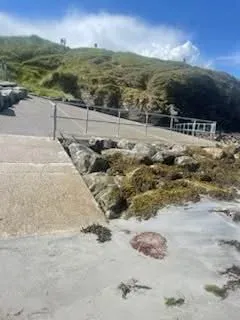Sligo, Ireland – Sligo County Council has issued a public safety advisory following the discovery of a Lion’s Mane jellyfish washed up at the second beach of Rosses Point, near the slipway at the entrance. Beachgoers are urged to exercise caution when visiting the area.
The Lion’s Mane jellyfish (Cyanea capillata), one of the largest and most venomous species found in Irish waters, can pose serious health risks to humans. Contact with its long, trailing tentacles can result in painful stings that may cause a range of symptoms including nausea, muscle cramps, sweating, headaches, and, in more severe cases, systemic illness that may require urgent medical treatment.
Lifeguards are currently on duty at Rosses Point, and visitors are encouraged to seek assistance immediately if stung.
First Aid Guidelines for Jellyfish Stings
The Health Service Executive (HSE) and Sligo County Council have outlined specific first aid measures to treat stings from jellyfish commonly found in Ireland. Here are the steps to follow:
If You’re Assisting Someone Who Has Been Stung:
- Take precautions to avoid being stung yourself.
- Gently remove any tentacles using a gloved hand, stick, or towel. If none of these are available, use the tips of your fingers carefully.
- Do not rub the affected area, as this can increase venom release.
- Rinse the area thoroughly with sea water. Avoid using fresh water, which can exacerbate the sting.
- At home, the area can be rinsed or bathed in warm to hot water to help alleviate pain.
- Apply a dry cold pack — place ice or a cold pack in a sealed plastic bag, then wrap in a cloth or t-shirt before applying.
- Seek medical attention if symptoms worsen or are more than mildly uncomfortable.
Avoid the Following:
- Do not rub the sting site.
- Never rinse with fresh water.
- Do not urinate on the sting — a popular myth with no scientific backing.
- Avoid using vinegar, which is ineffective and potentially harmful for stings from species common in Irish waters.
- Do not apply alcohol to the sting.
- Do not apply tight bandages, which can concentrate venom in one area.
More Information and Jellyfish Identification
The HSE provides additional information on jellyfish safety, including a downloadable Jellyfish Identification Card, helping beachgoers distinguish between species found in Irish waters.
Sligo County Council continues to monitor local beaches and urges the public to remain vigilant. For more on safe beach practices in Ireland, see our guide to coastal safety and jellyfish season in Irish waters.






